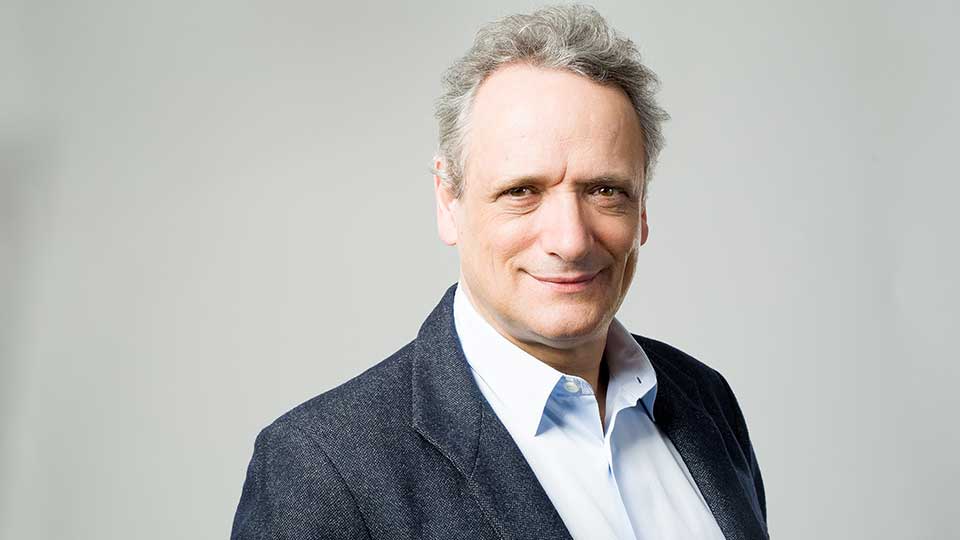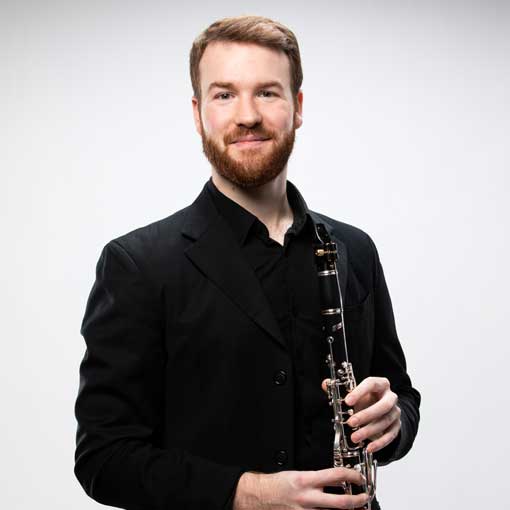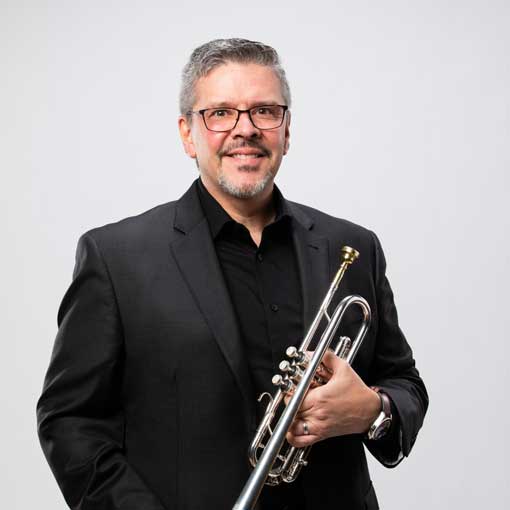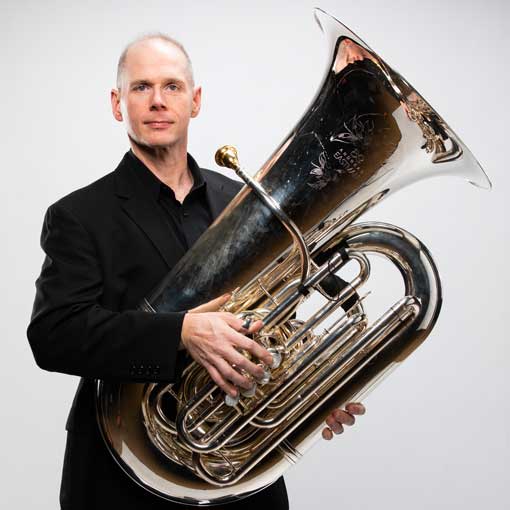Program:
GABRIELLA SMITH: Carrot Revolution
CHRISTOPHER CERRONE: A Body, Moving [CSO Commission, World Premiere]
AARON COPLAND: Concerto for Clarinet
DUKE ELLINGTON: Night Creature
Artists & Insights
-
Louis Langrée, Music Director, Louise Dieterle Nippert & Louis Nippert Chair

Louis Langrée has been Music Director of the Cincinnati Symphony Orchestra (CSO) since 2013 and Music Director of the Mostly Mozart Festival at Lincoln Center since 2003.
Langrée, known for imaginative programs, began his CSO tenure with Jennifer Higdon’s On a Wire with Eighth Blackbird, Copland’s A Lincoln Portrait, narrated by Maya Angelou and Beethoven’s Fifth Symphony. Two of his recordings with the CSO were Grammy-nominated in the Best Orchestral Performance category: Transatlantic, with works by Varèse, Gershwin, and Stravinsky; and Concertos for Orchestra, featuring world premieres by Sebastian Currier, Thierry Escaich, and Zhou Tian. His Pelléas et Mélisande trilogy contrasted settings by Fauré, Debussy, and Schoenberg. A multi-season Beethoven Revolution cycle paired the symphonies with world premieres and 20th-century masterworks, culminating with a recreation of the legendary 1808 Akademie.
A regular presence at Lincoln Center since his 1998 debut, Langrée has conducted around 250 concerts and productions, including more than 50 Metropolitan Opera performances; has taught Juilliard School masterclasses; appeared with the CSO as part of Lincoln Center’s Great Performers series; and made his New York Philharmonic guest conducting debut in March, 2020. Langrée has raised the artistic profile and repertoire of the Festival Orchestra well beyond the classical period, from Lully to Magnus Lindberg.
An advocate for the music of our time, Langrée has conducted premieres by Julia Adolphe, Daníel Bjarnason, Anna Clyne, Jonathan Bailey Holland, David Lang, Nico Muhly, André Previn, Caroline Shaw, and Julia Wolfe among numerous others including, with the CSO, the world premiere of Christopher Rouse’s Symphony No. 6, the composer’s final opus. Among the many period-instrument ensembles he has worked with are the Orchestra of the Age of Enlightenment, Freiburg Baroque, Concerto Köln, and Orchestre des Champs-Elysées.
Louis Langrée has guest conducted the Berlin Philharmonic, Vienna Philharmonic, London Philharmonic, Philadelphia Orchestra, Budapest Festival Orchestra, Czech Philharmonic, NHK Symphony, Orchestre National de France, Orchestre de Paris, and Leipzig Gewandhaus among others. In addition to the Met, he frequently conducts at the leading opera houses including the Vienna Staatsoper, Teatro alla Scala, Royal Opera House, Covent Garden, Lyric Opera of Chicago, and Bavarian Staatsoper, and at festivals including Glyndebourne, Aix-en-Provence, BBC Proms, Edinburgh International, and the Hong Kong Arts Festival.
Langrée was previously music director of the Orchestre de Picardie, Opéra National de Lyon, Glyndebourne Touring Opera, Orchestre Philharmonique Royal de Liège, and chief conductor of the Camerata Salzburg. A native of Alsace, France, he is a Chevalier des Arts et des Lettres and Chevalier de la Légion d’Honneur.
-
INSIGHTS
from Music Director Louis LangréeThe Cincinnati Symphony Orchestra has a long-standing tradition of working with living composers to bring their work to life. This weekend’s concerts feature four American composers, each of whom has a special connection with the CSO. We are also featuring our own Orchestra musicians as soloists.
We commissioned composer Gabriella Smith as part of our 125th Anniversary season, giving the world premiere of in September 2019 on a concert conducted by Eun Sun Kim. We open this weekend with Smith’s Carrot Revolution, a piece she originally composed for string quartet but has now adapted for string ensemble.
We had also commissioned Christopher Cerrone for our 125th season. The pandemic kept us from the premiere last spring, but we are pleased to finally present his concerto grosso for trumpet, tuba and orchestra, A Body, Moving.
The name Aaron Copland is synonymous with American music, and the CSO’s connection with him is very strong. The Orchestra gave the world premieres of two of his most famous works: Fanfare for the Common Man and A Lincoln Portrait. Copland also conducted the Orchestra several times, including a concert in April 1976 featuring his own Clarinet Concerto, with then-Principal Clarinet Richard Waller as soloist. We are thrilled to honor Copland’s CSO legacy by performing the concerto this weekend with our current Principal Clarinet, Christopher Pell, as soloist.
Edward (“Duke”) Ellington and his Trio played alongside the Orchestra in April 1966, and shortly thereafter he collaborated with Erich Kunzel to commercially record and release three pieces with orchestra: New World A-Comin’, Harlem, and The Golden Broom and the Green Apple. This weekend we will present Ellington’s Night Creature, originally written for full jazz orchestra and full symphonic orchestra.
LOUIS LANGRÉE has been Music Director of the Cincinnati Symphony Orchestra since 2013. His two most recent CSO recordings, Transatlantic and Concertos for Orchestra, were Grammy-nominated for Best Orchestral Performance, and several of his other recordings have received awards, including Gramophone, Diapason d’Or and International Classical Music awards. He is also Music Director of the Mostly Mozart Festival at Lincoln Center, and is invited as a guest conductor by the most prestigious orchestras and opera houses, including the Berlin, Vienna, London, Tokyo and New York Philharmonic orchestras and the Metropolitan Opera, Vienna State Opera, La Scala, Royal Opera House Covent Garden in London, Lyric Opera of Chicago and Bavarian State Opera. Louis Langrée is a Chevalier de la Légion d’Honneur and Honorary Member of the Confrérie Saint-Étienne d’Alsace, an Alsatian wine-makers’ brotherhood dating back to the 14th century.
Program Details
-
GABRIELLA SMITH
Carrot Revolution [cso premiere]
Born: December 26, 1991, Berkeley, California
Composition History: composed in 2015
Instrumentation: adapted for string ensembleIn the Composer’s Words: “I wrote Carrot Revolution in 2015 for my friends, the Aizuri Quartet. It was commissioned by the Barnes Foundation in Philadelphia for their exhibition, The Order of Things, in which they commissioned three visual artists and myself to respond to Dr. Barnes’ distinctive ‘ensembles,’ the unique ways in which he arranged his acquired paintings along with metal objects, furniture, and pottery, juxtaposing them in ways that bring out their similarities and differences in shape, color, and texture. While walking around the Barnes, looking for inspiration for this string quartet, I suddenly remembered a Cézanne quote I’d heard years ago (though which I later learned was misattributed to him): ‘The day will come when a single, freshly observed carrot will start a revolution.’ And I knew immediately that my piece would be called Carrot Revolution. I envisioned the piece as a celebration of that spirit of fresh observation and of new ways of looking at old things, such as the string quartet—a 250-year-old genre—as well as some of my even older musical influences (Bach, Perotin, Gregorian chant, Georgian folk songs, and Celtic fiddle tunes). The piece is a patchwork of my wildly contrasting influences and full of weird, unexpected juxtapositions and intersecting planes of sound, inspired by the way Barnes’ ensembles show old works in new contexts and draw connections between things we don’t think of as being related.
CHRISTOPHER CERRONE
A Body, Moving [cso commission, world premiere]
Born: 1984, Huntington, New York
Composition History: Composed 2020–21, on commission from the Cincinnati Symphony Orchestra, with support from Ann and Harry Santen.
Instrumentation: solo trumpet and tuba, 2 flutes (incl. alto flute), English horn, 2 clarinets (incl. bass clarinet), bassoon, 2 horns, 2 trumpets, 3 trombones, almglocken, bass drum, bicycle pump, cabasa, crotales, gongs, sandpaper blocks, sizzle cymbals, snare drums, vibraphone, harp, piano, stringsIn the Composer’s Words: “A Body, Moving draws its title from an epistolary poem written by the poet Natalie Diaz to her friend and fellow poet Ada Limón. Her whole title, ‘Isn’t the air also a body, moving?’ beautifully summed up my approach to this piece, which is a celebration of brass, but perhaps more than anything else a celebration of the movement of air through the room.
In the era of Covid-19, we’ve all suddenly become acutely aware of the air’s flow and its ability to make one another ill; I sought to create a piece, instead, that celebrates the air, the thing that animates so much making of music, be it singing or playing of brass and wind instruments. I am delighted that we can share this piece in front of real live audiences—something I truly took for granted until it was gone.
The opening movement starts with the air sounds of the solo trumpet and tuba, which are imitated and passed around the orchestra by a multitude of percussionists and brass players until the whole band becomes a rhythmic machine.
The second movement features what Diaz calls “envelope[s] of air.” I imagined the sound of the tuba played in reverse (a quick swell from nothing to “ff”) and I orchestrated a slow-moving passacaglia that trades these swells between the tuba and the trombones.
The final movement brings back the rhythmic air sounds from the first movement and is gradually joined by a slowly moving tuba line that moves ever downward towards the lowest A it can play, closing the work.
AARON COPLAND
Concerto for Clarinet and String Orchestra, with Harp and Piano
Born: November 14, 1900, Brooklyn, New York
Died: December 2, 1990, Sleepy Hollow, New York
Composition History: Composed 1947–48, for clarinetist Benny Goodman. Its premiere took place November 5, 1950 in a broadcast by the NBC Symphony, Fritz Reiner conducting, Benny Goodman, clarinet.
Instrumentation: solo clarinet, harp, piano, stringsCSO Subscription Performances: The CSO has performed the Clarinet Concerto on six previous subscription weekends. The CSO subscription premiere took place in December 1963, Benny Goodman, clarinet; the most recent subscription performance was in May 2011, Paavo Järvi conducting, Martin Fröst, clarinet. Aaron Copland led the CSO in his Concerto in April 1976, Richard Waller, clarinet.
EDWARD K. (“DUKE”) ELLINGTON
Night Creature [cso premiere]
Born: April 29, 1899, Washington, D.C.
Died: May 24, 1974, New York, New York
Composition History: Composed in 1956 on commission from Don Gillis and the Symphony of the Air, who gave the work’s premiere that year at Carnegie Hall.
Instrumentation: 2 flutes (incl. piccolo), oboe (incl. English horn), 2 clarinets (incl. bass clarinet), 2 alto saxophones, 2 tenor saxophones, baritone saxophone, bassoon, 2 horns, 4 trumpets, 3 trombones, tuba, timpani, claves, maracas, suspended cymbals, bongos, drum set, harp, piano, strings


